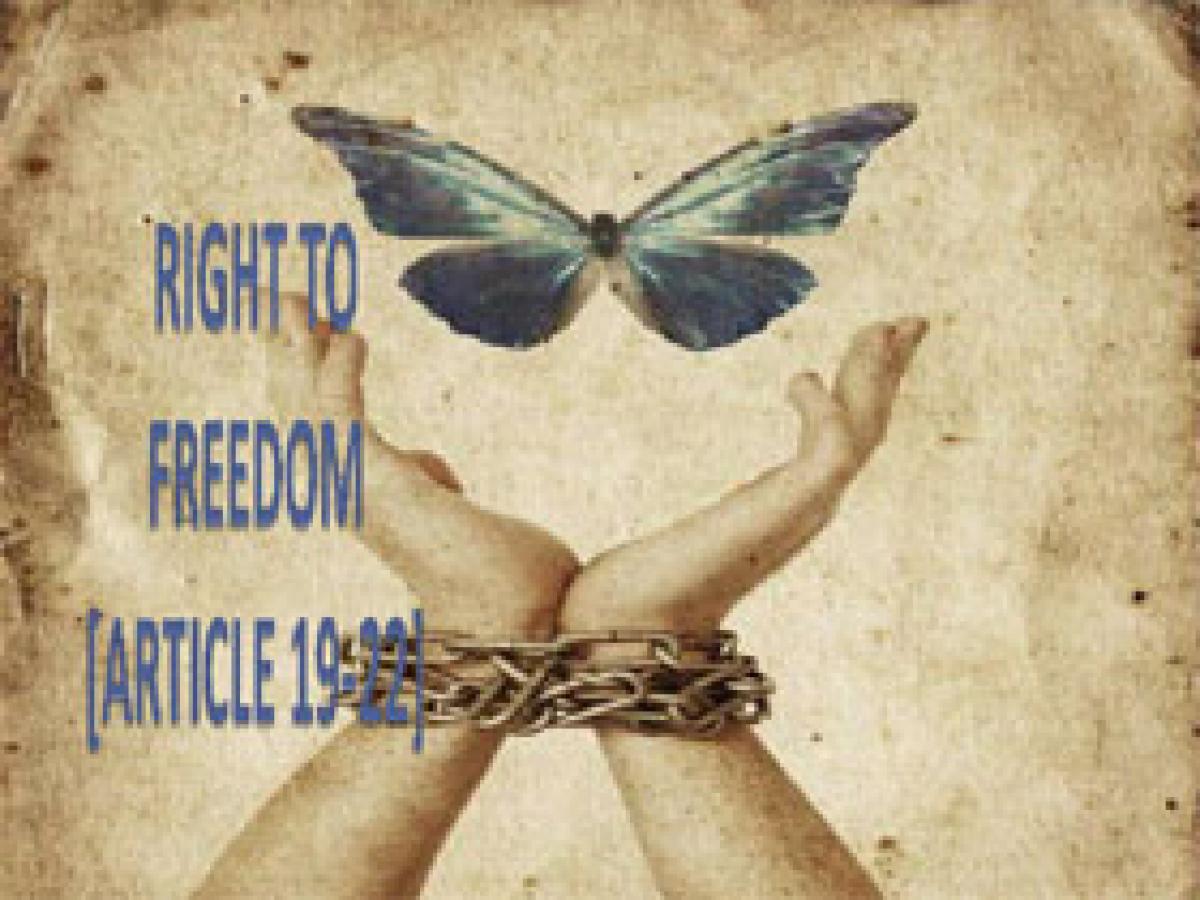Live
- Chanchalguda Jail Officials Say They Haven't Received Bail Papers Yet, Allu Arjun May Stay in Jail Tonight
- BJP leaders present evidence of illegal voters in Delhi, urge EC for swift action
- Exams will not be cancelled: BPSC chairman
- Nagesh Trophy: Karnataka, T.N win in Group A; Bihar, Rajasthan triumph in Group B
- Economic and digital corridors to maritime connectivity, India and Italy building vision for future, says Italian Ambassador
- SMAT 2024: Patidar's heroics guide Madhya Pradesh to final after 13 years
- CCPA issues notices to 17 entities for violating direct selling rules
- Mamata expresses satisfaction over speedy conviction in minor girl rape-murder case
- Transparent Survey Process for Indiramma Housing Scheme Directed by District Collector
- District SP T Srinivas Rao, IPS, Conducts Annual Inspection at Dharur Police Station
Just In

Right to Freedom in Indian Constitution The rights to freedom are the most important fundamental rights guaranteed by the constitution of India. It is the prevalence of these freedoms that make democracy meaningful.
.jpg) Right to Freedom in Indian Constitution The rights to freedom are the most important fundamental rights guaranteed by the constitution of India. It is the prevalence of these freedoms that make democracy meaningful.
Right to Freedom in Indian Constitution The rights to freedom are the most important fundamental rights guaranteed by the constitution of India. It is the prevalence of these freedoms that make democracy meaningful.
The original constitution as adopted in 1949 guaranteed seven such freedoms. By the 44th amendment, the right to hold and dispose of property has been removed from the list of fundamental freedoms in 1978.
The Rights have their origins in many sources, including England's Bill of Rights, the United States Bill of Rights and France's Declaration of the Rights of Man.
List of Rights to Freedom under Indian Constitution Art. 19 of the constitution now provide six freedoms, namely:
- Right to freedom of speech and expression,
- Right to assemble peaceably and without arms,
- Right to form associations or unions,
- Right to move freely throughout the territory of India,
- Right to reside and settle in any part of the territory of India,
- Right to practice any profession or to carry on any occupation trade or business.
Each one of these six freedoms is subject to some restrictions. For rights can never be absolute.Individual rights must be reconciled with the interests of the community.
It is logical that equal rights for all must mean limited rights for any. Hence, the state may impose ‘reasonable restrictions’ upon the exercise of any of these rights.
Restrictions
Firstly, the state may impose restrictions on the exercise of the right to freedom of speech and expression on eight grounds. These are:
- defamation,
- contempt of court,
- decency or morality,
- security of the state,
- friendly relations with other states,
- incitement of offence and,
- sovereignty and
- Integrity of India.
Secondly, the freedom to assemble is subject to two restrictions. The assembly must be peaceable and the members of assembly must not bear arms.
However the Sikhs are allowed to carry ‘Kirpan’ as part of their religious creed. In the U.S.A. right to bear arms is fundamental right. In India, this right is denied in the interest of public order.
Thirdly, the right to form associations or unions does not entitle persons to enter into criminal conspiracy either against individuals, groups or against the state.
Fourthly, the right to move freely or to reside and settle in any part of India, does not cover trespass into homes or restricted areas. State also may restrict this freedom to protect the aboriginal tribes.
Finally, the right to practice any profession or to carry on any occupation, trade or business are also subject to reasonable restrictions.
Thus professions or, trade or, business must not be harmful to the interest of the community. The state may also prescribe qualifications for particular profession or, technical occupation. The state may itself carry on trade or business to the exclusion of citizens.
Conclusion
Each one of the fundamental freedoms guaranteed by the constitution of India is hedged by many restrictions. They are not absolute.
This led to the criticism that Indian freedom is a myth and not reality for what has been given with one hand has been taken away with the other. This criticism is unfair.
For fundamental rights can nowhere be absolute. For logically, one can be absolutely free only when all others are absolute, slaves Individual freedom to be real must be social and hence must be limited.
There is a difference in the scheme of limitations on fundamental rights in the U.S. constitution and in the constitution of India. In the U.S.A. the restrictions are not mentioned in the constitution itself. This is left to judicial interpretations.
In India on the other hand, the restrictions are mentioned in the constitution itself. It is not left to the vagaries of judicial interpretation.
On the whole fundamental rights everywhere are restricted or, limited. As Mr. Justice Mukherji observed in A. K. Gopalan vs. State of Madras case”
There cannot be any such thing as absolute or uncontrolled liberty wholly freed from restraints.”

© 2024 Hyderabad Media House Limited/The Hans India. All rights reserved. Powered by hocalwire.com







